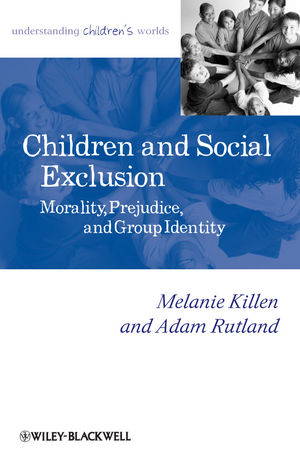Children and Social Exclusion: Morality, Prejudice, and Group IdentityISBN: 978-1-4051-7651-4
Hardcover
246 pages
May 2011, Wiley-Blackwell
 This is a Print-on-Demand title. It will be printed specifically to fill your order. Please allow an additional 10-15 days delivery time. The book is not returnable.
|
||||||
“Killen and Rutland provide expert broad-ranging reviews of relevant theories, research, and interventions and conclude with an integrative framework for understanding and addressing peer exclusion." (Journal of Applied Developmental Psychology, 2012)
"Highly recommended. Upper-division undergraduates through faculty and professionals." (Choice, 1 November 2011)"In sum, as we continue to understand and decipher the development of exclusion and inclusion in children, the framework provided by Killen and Rutland will be an unequivocal guide and impetus for a myriad of empirical studies in the human development field. After reading this impressive book, I believe the future of scholarship in this area (and our collective future) is bright and exciting!" (Human Development Journal, 2013)
This is an outstanding book. Through their masterful integration of developmental and social psychological theories and research, Killen and Rutland have made a major contribution to our understanding of children's morality, social identity, exclusion, and intergroup relationships. This very engaging book is a must-read for scholars and others interested in these important and timely topics.—Judi Smetana, University of Rochester
This book makes important and unique contributions to the study
of intergroup relations, morality, and social development.
The authors, who are distinguished scholars in this area, introduce
original insights that synthesize past research and will guide
research in this area for many years to come.
—John F. Dovidio, Yale University
This excellent book offers a sweeping treatment of a problem
that all people either experience or fear at some time in their
lives: social exclusion. The authors examine the problem from a
developmental perspective, offering a comprehensive account of the
roots, effects, and broader significance of social exclusion
during childhood. This original, integrative account now stands as
the definitive work on this familiar dimension of children's social
development.
— William Damon, Stanford University
Killen and Rutland have done an extraordinary job illuminating a
critical phenomenon: when and why children exclude other children.
This topic has never been more important, and their book is
scholarly, fascinating, wise, and extremely valuable. It is a
must-read for everyone interested in understanding how to work
toward a just society.
—Carol Dweck, Stanford University



